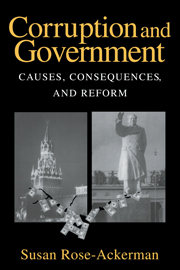Book contents
- Frontmatter
- Contents
- Preface
- 1 Introduction: The Costs of Corruption
- Part I Corruption as an Economic Problem
- Part II Corruption as a Cultural Problem
- Part III Corruption as a Political Problem
- 7 Corruption and Politics
- 8 Democracy and Corruption: Incentives and Reforms
- 9 Controlling Political Power
- Part IV Achieving Reform
- References
- Name Index
- Subject Index
8 - Democracy and Corruption: Incentives and Reforms
Published online by Cambridge University Press: 05 June 2012
- Frontmatter
- Contents
- Preface
- 1 Introduction: The Costs of Corruption
- Part I Corruption as an Economic Problem
- Part II Corruption as a Cultural Problem
- Part III Corruption as a Political Problem
- 7 Corruption and Politics
- 8 Democracy and Corruption: Incentives and Reforms
- 9 Controlling Political Power
- Part IV Achieving Reform
- References
- Name Index
- Subject Index
Summary
Democracies based on strong legal foundations provide a stable framework for economic activity. For this framework to operate efficiently, however, politicians must seek reelection and must feel insecure about their prospects, but not too insecure. This leads to a “paradox of stability.” Too much security of tenure can further corrupt arrangements. Too much insecurity can have the same effect.
The strength of the competitive political environment raises the stakes and reduces the likelihood of corruption. A competitive political system can be a check on corruption. For elected politicians the most immediate form of “punishment” occurs at the polls. The electorate may extract a cost even if the payoffs are kept secret. Bribes and illegal campaign donations are given in return for a benefit. Often the quid pro quo is something the corrupt politician would not have done without the payoff. If politicians vote against the interests of their constituents, they can expect to suffer at the polls.
The distinctive incentives for corruption in democracies depend on the organization of electoral and legislative processes and on the methods of campaign finance. These factors may be intertwined. Some electoral systems encourage the development of strong political parties while others encourage politicians to develop personal followings. Corrupt possibilities are related to the relationship between political structure and private wealth.
Electoral Systems
In a democracy, electoral voting rules and legislative processes interact with underlying political cleavages to affect the opportunities for corruption.
- Type
- Chapter
- Information
- Corruption and GovernmentCauses, Consequences, and Reform, pp. 127 - 142Publisher: Cambridge University PressPrint publication year: 1999



